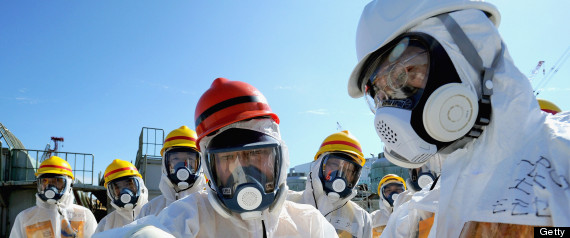
Japan Trade Minister Toshimitsu Motegi in protective suit checks the
situation of halting contaminated groundwater around the No. 1 and No. 2
reactors along the sea during his visit to Fukushima Dai-ichi Nuclear
Power Plant on August 26, 2013 in Okuma, Japan. (Photo by The Asahi
Shimbun/The Asahi Shimbun via Getty Images)
The Nuclear Regulation Authority's latest criticism of Tokyo Electric Power Co. came a day after the operator of the Fukushima Dai-ichi nuclear plant acknowledged that the 300-ton (300,000-liter, 80,000-gallon) leak probably began nearly a month and a half before it was discovered Aug. 19.
In a meeting with agency officials and experts Tuesday night, TEPCO said radioactivity near the leaky tank and exposure levels among patrolling staff started to increase in early July. There is no sign that anyone tried to find the source of that radioactivity before the leak was discovered.
On Wednesday, regulatory officials said TEPCO has repeatedly ignored their instructions to improve their patrolling procedures to reduce the risk of overlooking leakages. They said TEPCO lacked expertise and also underestimated potential impact of the leak because underground water is shallower around the tank than the company initially told regulators.
"Their instructions, written or verbal, have never been observed," Toyoshi Fuketa, a regulatory commissioner, said at the agency's weekly meeting Wednesday.
TEPCO acknowledged recently that only two workers were assigned to check all 1,000 storage tanks at the plant during their twice-daily, two-hour walk without carrying dosimeters, and their inspection results were not adequately recorded. TEPCO said it will increase patrolling staff to 50 from the current eight.
Earlier this week, Japan's industry minister, Toshimitsu Motegi, said the government will take over cleanup efforts and allocate funding for long-term contaminated water management projects.
The nuclear authority originally gave a Level 1 preliminary rating – an "anomaly," to the tank leak. Last week the authority proposed raising that to Level 3 – a "serious incident" – and it made that change after consulting with the International Atomic Energy Agency.
The IAEA's ratings are designed to inform the international community, and changing them does not affect efforts to clean up the leak by the government and TEPCO. The 2011 Fukushima disaster itself was rated the maximum of 7 on the scale, the same as the 1986 Chernobyl accident.
Tanaka said there is a much larger ongoing problem at the plant: massive amounts of contaminated ground water reaching the sea. But that problem cannot even be rated under the IAEA's International Nuclear and Radiological Event Scale because it is unknown exactly how much ground water is escaping, how contaminated it is and what effect it is having on the sea and marine products.
Tanaka said TEPCO's handling of the water leaks was slow, illogical and lacked risk management. TEPCO has yet to determine the cause of the latest leak.
"I'm baffled," he said. "It may take time to stabilize the plant but we must put it on a right track."
TEPCO has recovered some of the water that leaked from the tank but says some of it may have reached the sea through a rainwater gutter. It says most of the leakage is believed to have seeped into the soil, triggering fresh concern of further contamination of underground water downstream.
TEPCO has built hundreds of tanks to hold radioactive water, some of which is ground water that made its way to the plant, but hundreds more tons of contaminated water are believed to be entering the sea each day.
The plant suffered triple meltdowns after the massive earthquake and tsunami in March 2011. TEPCO is putting tons of water into its reactors to cool them and is struggling to contain the resulting waste water.
___
AP writer Elaine Kurtenbach contributed to this report.
via/ http://www.huffingtonpost.com
Ah, yes. Did you get to my Fukushima rants over on my blog? I've more than a couple. Have kind of quit, since any "urgent" action is clearly not going to happen. You can follow my stuff from day 1, I think; or nearly.
ReplyDeleteThe biggest question to me is- why are US entirely silent? Where is the news about "Princeton Physics Professor Says Fukushima Is Really Bad!" ?
I'm an evolutionary ecologist; which means I received modest, not expert, training in a bunch of areas, including geology, physics, chemistry, meteorology. And it was CLEAR - to ME - that what the press was reporting (Huge radiation measured, but no one sure where it came from!) was nonsense. That the cores had melted through containment - was obvious at the outset. Sure, I expected our military spy satellites to show this- and our intelligence community to keep quiet about it- but- somewhere, in the USA or Europe- there should be ONE professor with a blabbermouth.
But no. Silence.
Press is starting to let it out, now-
http://globalpublicsquare.blogs.cnn.com/2013/08/30/why-fukushima-is-worse-than-you-think/
Paving the way for much larger efforts- but we still have the problem that no one has any idea for what to do with the stuff- once you have it "vacuumed" up, metaphorically.
Yep. Very. Bad.
Will get worse. Don't live within 200 miles of a nuclear plant, if you can help it. (I'm within 70; most Americans are.)
I wish there were an easy "edit comment" button... but no. That was supposed to be "why are US ACADEMICS entirely silent?
ReplyDelete